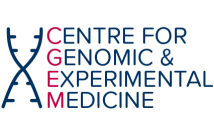First research publication attributed to the XDF Programme
One of our XDF Programme Fellows, Dr Chantriolnt-Andreas Kapourani, authored an exciting research paper in “Genome Biology”: April 2019

The Cross-Disciplinary Fellowships [XDF] Programme at the University of Edinburgh (UoE) partners the MRC Institute of Genetics & Molecular Medicine (IGMM) with the School of Informatics (SoI) to maximise new cross-disciplinary opportunities in scientific discovery at the Life Sciences/ Computational interface, and their translational and innovation impact. It is led by a panel of directors including Professors Chris Ponting (MRC Human Genetics Unit/IGMM), Margaret Frame (Cancer Research UK Edinburgh Centre/IGMM), Tim Aitman (Centre for Genomic and Experimental Medicine/IGMM), Guido Sanguinetti and Jane Hillston (both from SoI), who are supported by Dr Arkadiusz Welman (Cancer Research UK Edinburgh Centre/IGMM) acting as scientific administrator. The Programme has been designed to recruit analytically minded people with strong computational skills to help solve some of the most challenging problems of contemporary biomedical research. The first recruits joined the XDF Programme in 2018 and it is most satisfying to observe their integration with the scientific community in Edinburgh as well as multiple productive collaborations resulting from Fellows’ interactions with colleagues in IGMM and across the University.
The 21st of March 2019 was a notable date for the Programme as it marked the first scientific-research journal publication that acknowledges the XDF Programme support. In a study titled “Melissa: Bayesian clustering and imputation of single-cell methylomes” published in the journal “Genome Biology”, Dr Chantriolnt-Andreas Kapourani (one of the Fellows recruited in 2018) and Prof Guido Sanguinetti describe a new computational method - Methylation Inference for Single Cell Analysis (Melissa) – to aid single cell DNA methylation studies in biomedicine.
DNA methylation is a process by which methyl groups are added to the DNA molecule. It belongs to so called epigenetic modifications – modifications that do not involve changes to the underlying DNA sequence. Methylation can change the activity of a DNA segment. In mammals DNA methylation is essential for normal development and is associated with a number of key processes including genomic imprinting, X-chromosome inactivation, repression of transposable elements, aging, and carcinogenesis. Yet its role in gene regulation and the molecular mechanisms underpinning its association with diseases are still imperfectly understood. DNA methylation measurements at single-cell level are rapidly becoming a major tool to understand epigenetic gene regulation in individual cells, however all available technologies are plagued by intrinsically low coverage in terms of numbers of assayed methylated DNA stretches (so called CpGs). The authors propose Melissa as a way of addressing low coverage issue by sharing information between CpGs with local smoothing and between cells with Bayesian clustering prior. This methodology should have significant impact on future methylation studies.
Related Links
Article in “Genome Biology”: https://genomebiology.biomedcentral.com/articles/10.1186/s13059-019-1665-8
Cross-Disciplinary Fellowships [XDF] Programme website: https://www.ed.ac.uk/cross-disciplinary-fellowships
XDF Programme Fellows 2018: https://www.ed.ac.uk/cross-disciplinary-fellowships/programme-fellows
XDF Programme Directors: https://www.ed.ac.uk/cross-disciplinary-fellowships/programme-directors


